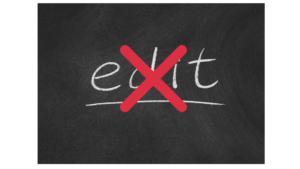Table of Contents
Bankruptcy Conversion and Exemption Objection Deadlines
Does a converted bankruptcy case restart the deadline for objections to exemptions?
A recent look at objecting to exemptions and Rule 4003 revealed a circuit split — despite the rule’s text — as to whether a bankruptcy that is filed as Chapter 11 or as Chapter 13 but then converted to Chapter 7 resets the clock for objections to exemptions.
The Issue
The FRBP rule says that the opportunity to object to exemptions is within 30 days of the 341a meeting. But when a case is filed as a Chapter 11 or Chapter 13, the trustee and creditors are not quite as motivated to challenge exemptions as in Chapter 7, as these chapters are not about liquidation or taking nonexempt assets for the benefit of the creditors. However, when a case is then converted to Chapter 7, a trustee who is focused like a laser beam on exemptions is then appointed. However, the 341(a) meeting was already concluded months (if not years) ago and the new trustee doesn’t get a chance to object to the exemptions.
Some courts have found this to be unfair as a backdoor way around exempting assets or a violation of due process, and the courts have allowed a new deadline. Others have held true to the statute’s plain text. This has led to a split in the circuits.
“There is strong textual support for both positions, the closest Supreme Court decision [citing Taylor] does not compel either result and there are policy considerations weighing in favor of both interpretations. The issue is ripe for a clarifying amendment or decision by the Supreme Court.†In re Bell, 225 F. 3d 203, 222 (2nd Cir 2000) (Moran J, dissenting).
A Survey of the Court Split
What follows, then, is a look at some of the cases which have landed on different ends of the issue, to see if there’s a discernible pattern.
By Circuit
Allows New Opportunity to Object
- 2nd Cir: In re de Kleinman, 172 BR 764, 769 (Bankr Ct, SDNY 1994): “The rule authorizing a new objection period represents the only practical construction of the law.” superseded by Bell
- In re Bell, 225 F. 3d 203, 218 (2nd Cir 2000)(Moran J, dissent): “But for the purpose of overseeing the liquidation of an estate once the case has been converted to Chapter 7, the trustee and creditors should have the opportunity to evaluate and object to previously claimed exemptions if the property [of the estate] remains in the debtor’s possession.”
- 3rd Cir: In re Mims, 249 B.R. 378, 383 (Bankr Ct NJ, 2000): “For these reasons, the court holds that the new trustee’s objections to the debtor’s exemptions are permitted under Rule 4003(b).”
- 4th Cir: In re Leydet, 150 BR 641, 644 (Bankr Ct, EDVA 1993): ” Accordingly, I find that the “meeting of creditors” referred to in Bankruptcy Rule 4003(b) includes the meeting of creditors held when a case is converted from one under chapter 11 to one under chapter 7.”
- 6th Cir: In re Wolf, 244 BR 754, 759 (Bankr Ct, EDMI 2000): “Not until the second § 341 hearing, after conversion, is there a trustee who has the incentive, focus, interest and awareness of the importance of the exemption issue, and who is the person charged with administration of the estate, including making objections to exemptions.”
- In re Havanec, 175 BR 920, 924 (Bankr Ct, NDOH 1994): “Rule 1019(2) provides specifically for some new filing periods after conversion of the case to chapter 7. It does not provide a new filing period for objecting to the debtor’s exemptions. But this omission is not compelling. “
- 8th Cir: In re Alexander, 236 F.3d 431, 432 (2001) (8th Cir, 2001)(per curiam): “Initially, we reject Alexander’s challenge to the timeliness of the Chapter 7 Trustee’s objection. Both the Chapter 13 and Chapter 7 Trustees filed objections to his homestead exemption within thirty days of the respective meetings of creditors.”
- 10th Cir: In re Campbell, 313 BR 313, 319 (10th Cir BAP, 2004): “Being governed by no binding precedent, we adopt the minority view, holding that the thirty-day period to object to a debtor’s claimed exemption in Bankruptcy Rule 4003(b) recommences upon the conversion of a Chapter 13 case to a Chapter 7 case.”
- 11th Cir: In re Weissman, 173 B.R. 235, 237 (Bankr Ct, MDFL 1994): “For these reasons, the only reasonable construction of § 4003(b) is to allow the language to convey its plain meaning and permit the Chapter 7 Trustee an opportunity to object to the claimed exemptions, provided that the Trustee files the objection within thirty (30) days after the § 341 meeting following conversion.”
- In re Bergen, 163 BR 377 (Bankr Ct, MDFL 1994): “For the above reasons, this Court would permit a trustee to file objections to the Debtors’ claim of exemptions if made within 30 days after the meeting of creditors in the converted Chapter 7.”
- In re Jenkins, 162 BR 579, 581 (Bankr Court, MDFL 1993): “This Court is …satisfied that despite the fact that Rule 1019(2) fails to retrigger the time-frame within which an Objection to Claim of Exemption must be filed, the Chapter 7 trustee should have an opportunity to do so when the facts discovered warrants, provided that the trustee files the objection within thirty days of the conclusion of the § 341 meeting held after conversion.”
- In re Lang, 276 BR 716, 721 (Bankr Ct, SDFL 2002):Â “This Court further concludes that the omission in Fed. R. Bank Pro. 1019(2) of any reference to a new period for the filing of objections to a debtor’s claimed exemptions does not mean that the establishment of a new period to object upon conversion is prohibited. The silence of Rule 1019 regarding the period after conversions is more indicative of the inherent weaknesses of legislative drafting or of the drafter’s confidence that the existence of a renewed period to object upon conversion was sufficiently clear. “
Doesn’t Restart
- 2nd Cir: In re Bell, 225 F. 3d 203, 218 (2nd Cir 2000): “And because conversion does not change the date of the order for relief, see 11 U.S.C. § 348(a), that conversion does not reset the limitations period for filing objections to a debtor’s claimed exemptions.” (specifically limiting its rationale to converted Chapter 11 cases, not Chapter 13 cases)
- 5th Cir: In re Sandoval, 103 F. 3d 20, 21 (5th Cir 1997): “Because we conclude that the bankruptcy court improperly determined the exemption at the date of conversion rather than the date of filing of the original petition, we reverse.” (not specifically addressing Rule 4003, but used by Ferretti for that purpose)
- 6th Cir: In re Page, 240 BR 548Â (Bankr Ct, WDMI 1999): “Although the cases are not unanimous, the better reasoned decisions hold that the 30-day period for objecting to exemptions commences at the conclusion of the “first” first [sic] meeting of creditors, and not at the conclusion of any subsequent meetings that may be held as a consequence of a conversion of the case from one chapter to another. Therefore, the convening of a subsequent meeting of creditors following the conversion of the Debtor’s case from chapter 13 to chapter 11 did not trigger a new 30-day period for objecting to exemptions.”
- 9th Cir: In re Smith, 235 F. 3d 472, 477 (9th Cir 2000): “However, conversion does not reset the date of the order for relief. 11 U.S.C. § 348(a). ‘The purpose of section 348 is to preserve actions already taken in the case before conversion…. To effect this purpose, section 348(a) establishes the general rule that, in a converted case, the dates of the filing, the commencement of the case and the order for relief remain unchanged by the conversion.’ …Except for certain specifically enumerated filing deadlines, see 11 U.S.C. § 348(b) and (c), § 348 “does not effect a change in the date of … the order for relief.” 11 U.S.C. § 348(a).” (citing Bell)
- In re Rogers, 278 BR 201, 204 (Bankr Ct, NV 2002): “Given that the same statutory scheme applies in both conversions from Chapter 11 to Chapter 7, as in In re Smith, 235 F.3d 472 (9th Cir.2000), and to Chapter 13 to 7 conversions, as here, this Court is bound by the more recent analysis of the Ninth Circuit Court of Appeals in Smith. Accordingly, the objections of Skyline and the trustee are hereby denied.”
- 10th Cir: In re Beshirs, 236 BR 42 (Bankr Ct, KS 1999): “This scheme is complete, and nothing in it suggests that a chapter 7 trustee is entitled to a new time to object to the exemptions the debtors claimed at the outset of their chapter 13 case or that the debtors must amend their exemptions upon conversion of their case based on the facts that then exist.” Citing In re Marcus, 1 F.3d 1050, 1051 (10th Cir 1993) for rule that the date of filing controls whether exemptions are available.
- 11th Cir: In re Ferretti, 230 BR 883, 890 (Bankr Ct, SDFL 1999), affirmed without opinion 268 F. 3d 1065 (11th Cir 2001): “Given that the statutory directive is clear that property of the estate is determined as of the original filing date, and that most courts also hold that exemptions are determined as of the original filing date, this court finds that objections to exemptions must also be raised within thirty days of the original filing date.” (rejecting Weissman, also a 13, above):
By Chapter
Converting From Chapter 11
- In re de Kleinman above: New objection allowed. Replaced by Bell
- In re Lang above: New objection allowed.
- In re Wolf above: Allowed.
- In re Havanec above: Allowed.
- In re Bergen above: Allowed.
- In re Leydet above: Allowed.
- In re Bell above: No reset.
- In re Smith above: No reset.
Converting From Chapter 13
- In re Mims above:Â (7 to 13 to 7): New objection allowed.
- In re Weissman above: Allowed
- In re Alexander above: Allowed.
- In re Jenkins above: Allowed.
- In re Campbell above: Allowed.
- In re Rogers above: No reset.
- In re Ferretti above: No reset.
- In re Beshirs above: No reset.
- In re Page above: No reset. (converted from 13 to 11)
Second Circuit in Bell (a Chapter 11 to 7 conversion): “Inasmuch as these courts have been really concerned about abuse in Chapter 13 to Chapter 7 conversions, these concerns are beyond the scope of our holding.”
What does it all mean
The Majority and Minority Views
This isn’t meant to be a comprehensive list of all converted cases, but just an attempt to find the leading cases from each circuit, if available. When you review the cases, by circuit or chapter, no real pattern emerges.
While some opinions refer to the majority view or minority view, it’s not clear if they’re referring to just sheer volume of cases citing this rule (assuming they could find and tally them all), the ones they found, or some other metric.
Counting up the Circuits
The most sensible way to view this seems to be by counting number of circuit courts of appeal rulings, then BAP rulings, and try to sum up the circuits that way. Counting that way, only one circuit court allows restarting upon conversion (8th with Alexander), joined by the 10th Circuit BAP.
Going the other direction, three Courts of Appeals do not restart the 4003 objection deadline at conversion: 2nd with Bell, 9th with Smith, and the 11th with Ferretti. The 5th and 10th hint at getting there by extending other rules with Sandoval and Beshirs/Marcus, respectively.
For those keeping score at home, that’s one (1) circuit court and a BAP ruling on restarting the objection deadline at conversion. That’s contrasted with three (3) circuit courts saying the first 341a Meeting was “the” meeting and no further deadline exists, with maybe two others signaling they’d agree, making a total of five (5). Five against possibly two puts the “no restart on conversion” in the majority view, by this metric.
What next?
This bankruptcy attorney concurs with one of the court’s rulings cited above: “In any case, this Court agrees with the Bell dissent that the time is ripe for a Supreme Court determination of this issue.” In re Lang, 276 BR 716, 721 (Bankr Ct, SDFL 2002).
May it happen soon, and adopt the true majority view which respects the SCOTUS Taylor ruling and the majority view that the statute does not allow for a new deadline upon conversion.





